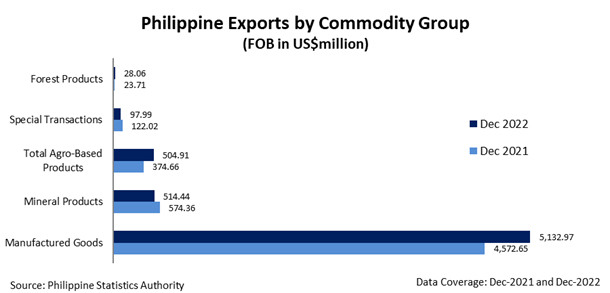PH Monday Macro: With China opening up, there’s little to be concerned about Philippine GDP in the coming quarters

Last week, we talked about the Philippine economy continuing its resiliency despite having contraction woes. We also mentioned that the economy may even grow further with China’s reopening.
Since China is the Philippine’s largest trading partner, how is our economic trade going to benefit GDP? Today we will dive into the Philippine’s economic trade industry, mainly its exports, and its impact on the global economic system.
Philippine Markets Newsletter:
The Monday Macro Report
Powered by Valens Research
Some people think that since the Philippines is an agricultural country, our major exports would naturally be agricultural commodities.
On the contrary, agricultural import expenses were higher than agricultural export earnings in 2021. We were even importing more rice than we were exporting.
What makes up a huge chunk of the nation’s exports is actually manufactured goods. These range from electronic products to machinery components.
That said, the Philippines does not produce these manufactured products from scratch, but rather, assembles them, importing the parts needed.
Since the cost of labor is relatively cheaper in the Philippines, it makes sense for companies to outsource this labor-intensive part of the manufacturing process.
A leading product the Philippines exports is integrated circuits, and one of the country’s top trade partners for this particular product is China.
Two years ago, China accounted for 31.9% of Philippine imports and 16.2% of exports which makes the country the Philippines’ most significant trading partner in terms of trade value. Other major trade partners of the Philippines include the U.S and Japan who imported 13.5% and 12.9% of our goods, respectively.
However, China’s economic activity has been muted lately because of its “Zero-COVID” policy that limited spending and productivity—it was probably the only major economic power yet to fully open up.
So when the Chinese government announced late last year an end to such a policy, investors applauded, expecting a return to pre-pandemic global economic activity.
China was not only the second-largest economy in the world, it also played a vital role in manufacturing companies achieving economies of scale through mass-produced goods.
This is why when China closed its borders and limited its economic activity, multinational companies were faced with a production problem. This resulted in the prices of goods increasing.
What does China’s reopening mean for the Philippines?
With net exports accounting for only around 2% of GDP, trade with China doesn’t sound that big. However, as long as China is back in the production cycle and supply chain issues are resolved with port openings, the Philippines is set to benefit from this increased economic activity.
You see, every country that trades with one another is important to the global economic ecosystem. Each economy is part of this nexus system that affects each other.
A great example of this is the automotive industry.
Cars require a long list of component inventory. This could be glass, copper, steel, aluminum, and hundreds of other commodities and parts.
Each of these components comes from different countries that specialize in manufacturing the parts or extracting the raw materials. In short, the supplies to assemble a car takes a complex chain that involves incorporating many countries’ exports.
One important component to build a vehicle is the semiconductor chip. This was actually the main reason why car prices have been elevated since the pandemic—there was a shortage of the item.
This is where the Philippines come in. The Philippines is included in the top 10 largest exporters of this electronic product and contributes 80% of its total exports. Given the nexus spirit of the global economy, China’s reopening will lead to many cascading effects.
The Philippines will be able to assemble the integrated circuit, increasing the supply in the car market. An increase in chips for cars would ease inflated car prices, which arguably could make it easier for more consumers to purchase cars.
This also means that the materials and components used to build such vehicles would see a rise in demand, which will make other countries’ output to climb.
China’s reopening and its mitigation of the issues in the auto industry is one of the many examples of how it affects the global economic ecosystem. Supply bottlenecks in other industries will likely improve, and the consumers actively looking for alternatives to products due to high prices will finally see gradual price alleviation.
Therefore, barring any pandemic-related issues, we can expect to see further improvements in Philippine GDP in the coming quarters as China gets back on track.
About the Philippine Markets Newsletter
“The Monday Macro Report”
When just about anyone can post just about anything online, it gets increasingly difficult for an individual investor to sift through the plethora of information available.
Investors need a tool that will help them cut through any biased or misleading information and dive straight into reliable and useful data.
Every Monday, we publish an interesting chart on the Philippine economy and stock market. We highlight data that investors would normally look at, but through the lens of Uniform Accounting, a powerful tool that gets investors closer to understanding the economic reality of firms.
Understanding what kind of market we are in, what leading indicators we should be looking at, and what market expectations are, will make investing a less monumental task than finding a needle in a haystack.
Hope you’ve found this week’s macro chart interesting and insightful.
Stay tuned for next week’s Monday Macro report!
Regards,
Angelica Lim
Research Director
Philippine Markets Newsletter
Powered by Valens Research
www.valens-research.com





